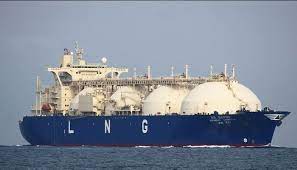Doha March 21 2022: Germany hopes to lock down a long-term LNG import deal with LNG powerhouse Qatar as Berlin looks to eliminate the need for Russian gas.
German economy minister Robert Habeck said March 20 following talks with Qatar’s Emir, Sheikh Tamim bin Hamad al-Thani, and energy minister Saad al-Kaabi that Doha was also prepared to boost gas deliveries in the shorter term.
“It is the Ukraine crisis that has brought me [to Doha], an attempt to wean ourselves off Russian oil, gas and coal as quickly as possible, and in this case, in particular gas,” Habeck said in comments posted to the economy ministry’s Twitter handle.
“Qatar is ready to increase gas supply and we need more gas in the short term to replace Russian gas,” Habeck said.
“Talks were not just about the short term either, but also on long-term energy policy. The good news is Qatar is ready. Now companies need to finalize the relevant contracts.”
Qatar’s state-owned QatarEnergy said March 20 it had begun talks with Germany to provide long-term LNG supply after receiving assurances that Berlin was serious about building up its ability to import gas.
Qatar had discussed providing LNG to Germany “for years,” but agreements were not made “due to the lack of clarity on the long-term role of gas in Germany’s energy mix and requisite LNG import infrastructure,” QatarEnergy said in a statement.
According to the statement, Habeck confirmed that the German government had taken “swift action and concrete actions to fast-track the development of two LNG receiving terminals in Germany as a matter of priority.”
“The two sides agreed that their respective commercial entities would re-engage and progress discussions on long-term LNG supplies from Qatar to Germany,” QatarEnergy said.
There was no mention of the amount of LNG that Germany would look to contract, either in the statement or Habeck’s comments.
Russian dependence
Germany is the biggest buyer of Russian gas and is particularly dependent on imports from Russia to meet demand.
Russia’s state-controlled Gazprom sold 45.8 Bcm of gas in Germany in 2020, and increased sales by 10.5% last year, implying a total of 50.6 Bcm in 2021. That accounted for some 60% of German gas demand last year.
Habeck was quoted as saying in German media March 20 that Germany still needed Russian gas, but that would not always be the case.
German Chancellor Olaf Scholz on Feb. 27 said Berlin had decided to fast-track the construction of two LNG terminals — one at Brunsbuttel and one at Wilhelmshaven — to help reduce Germany’s dependence on Russia.
Germany’s Uniper is looking at restarting work on a floating LNG import terminal at Wilhelmshaven in northern Germany, a company spokesperson said the following day.
Uniper in November 2020 shelved plans for a 10 Bcm/year floating LNG import facility after market players showed lukewarm interest in booking long-term capacity at the plant.
Wilhelmshaven is one of three planned LNG import terminals in Germany along with the 8 Bcm/year German LNG project at Brunsbuttel and the proposed 12 Bcm/year import facility at Stade.
The German economy ministry said March 6 the floating terminal at Wilhelmshaven could be realized in two years, while the project at Brunsbuttel would require 3-3.5 years, which would give it a 2025 start of operations.
The earliest start of operations for the Stade terminal is estimated at end-2026.
Germany’s renewed push for LNG infrastructure comes as European gas prices remain at sustained highs.
The TTF month-ahead gas price hit a new record high on March 8 of Eur212.15/MWh, according to Platts assessments by S&P Global Commodity Insights, an increase of 1,190% year on year.
It has since come down and was assessed March 18 at Eur101.28/MWh.
Qatari supplies
Qatar is already a key LNG supplier to the European market, with deliveries totaling some 23 Bcm in 2021, according to data from S&P Global Commodity Insights, meeting around 5% of total European consumption.
Its biggest markets last year were Italy (6.6 Bcm) and the UK (6.2 Bcm), followed by Belgium (3 Bcm), Spain (2.7 Bcm), and Poland (2.4 Bcm), the data showed.
Smaller volumes were also delivered to Greece, Turkey, Croatia, the Netherlands, France, and Portugal.
Asia is Qatar’s biggest market for LNG deliveries, with a total of 78.5 Bcm delivered in 2021, with India, South Korea, China, and Japan the biggest buyers.
Qatar is on track to expand its LNG production capacity from its current 77 million mt/year (106 Bcm/year) to 126 million mt/year by 2027.It first announced plans to boost its LNG production capacity further to 126 million mt/year by 2027 in November 2019.
It plans to first boost its LNG production capacity to 110 million mt/year with the addition of four more trains and to 126 million mt/year with the addition of two further trains.
Kaabi has also said that Qatar could even expand its production capacity further.
Its LNG trains are fed by the giant North Field, which is now undergoing further development.










